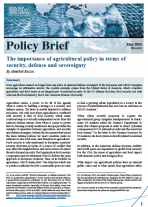The importance of agricultural policy in terms of security, defense and sovereignty
Agriculture seems, a priori, to be off of the agenda when it comes to building a strategy or a security and defense system. The latter is mostly attached to military structures. The only area where agriculture is combined with security is that of food security, which many countries keep as a virtually independent sector from the national defense system. Even when it comes to power factors, farming is rarely mentioned. Europe provides the example of separation between agriculture, and security and defense strategies. Indeed the documents that layout the main defense policies for most countries make no reference to the food issue, and therefore to agriculture. Food security is only mentioned in European countries’ security doctrines in terms of a source of conflict that may affect the neighborhood, and not in terms of a direct threat to Europe’s security. The Organization for Economic Cooperation and Development (OECD) follows the same approach as European countries. Thus, in its booklet on agriculture, OECD claims that: "The objective which was to produce sufficient food for a reasonable price in order to feed a growing urban population in a society in the process of industrialization has now lost its relevance in OECD countries."
Does agriculture indeed no longer have any place in national defense strategies? If the European and OECD examples encourage an affirmative answer, the counter-example comes from the United States of America, which considers agriculture and food issues as an integral part of national security. In the US defense doctrine, food security not only concerns the food industry, but it also concerns all areas of security. When China recently proposed to acquire the agrochemical group Syngenta headquartered in Basel, some US senators asked the Treasury Department to study this Chinese proposal in order to detect "potential consequences for US national security and the American food system." In the letter to the Treasury Secretary by US senators, the food system is directly related to national security.
In addition, in the American defense doctrine, stability and world peace are dependent on global food security. For the USA, the issues of agriculture and food impact both domestic policy and foreign policy.
What impact can agricultural policies have on internal public order and to what extent does agriculture affect that relationship in terms of foreign policy? These are the questions that will next be analyzed taking into account the importance of agricultural policy.
1. Agriculture and internal public order
The historian Charles Pouthas makes the direct link between the European agricultural situation from 1847 to 1848 and the revolts that followed throughout Europe. These revolts led to the collapse of the French monarchy with Louis Philippe’s abdication, the abandonment of power by Metternich in Vienna and the advent of the first parliament in Germany. Addressing social unrest between 2007 and 2008, Pierre Janin, geographer at the Institut de Recherche pour le Développement (IRD), concludes that: “The "hunger riots" show the growing distrust of impoverished populations vis-à-vis all state and international institutions that are nevertheless called to the rescue. They also illustrate public mobilization capacity, sometimes spontaneous (movements such as "against high prices," the "housewives parades"), sometimes relayed by union movements and political opposition. In this regard, they inaugurate a crisis of governance and legitimacy from which lessons must be learned.”
The geography of the Arab Spring is also quite revealing in terms of the linkages between food security and agricultural development on the one hand, and stability and internal security on the other. The Middle East and North Africa (MENA) region, the area of the Arab spring events, is one of the main importing regions of the planet for staples such as grain, sugar, oils, poultry and beef. Excluding Morocco, most of these states have always rejected agricultural policies in favor of relying on imports to feed their populations. The countries that were spared of Arab Spring crises are:
- Either those with oil revenues with revenues to ensure the proper supply of the population (Gulf countries and Algeria);
- Or those with a well-established agricultural policy (Morocco).
The MENA region and sub-Saharan Africa are thus characterized by their strategic vulnerability in food security, and largely depend on imports as shown in Map 1 below.
Map 1: Cereal Imports by Arab countries
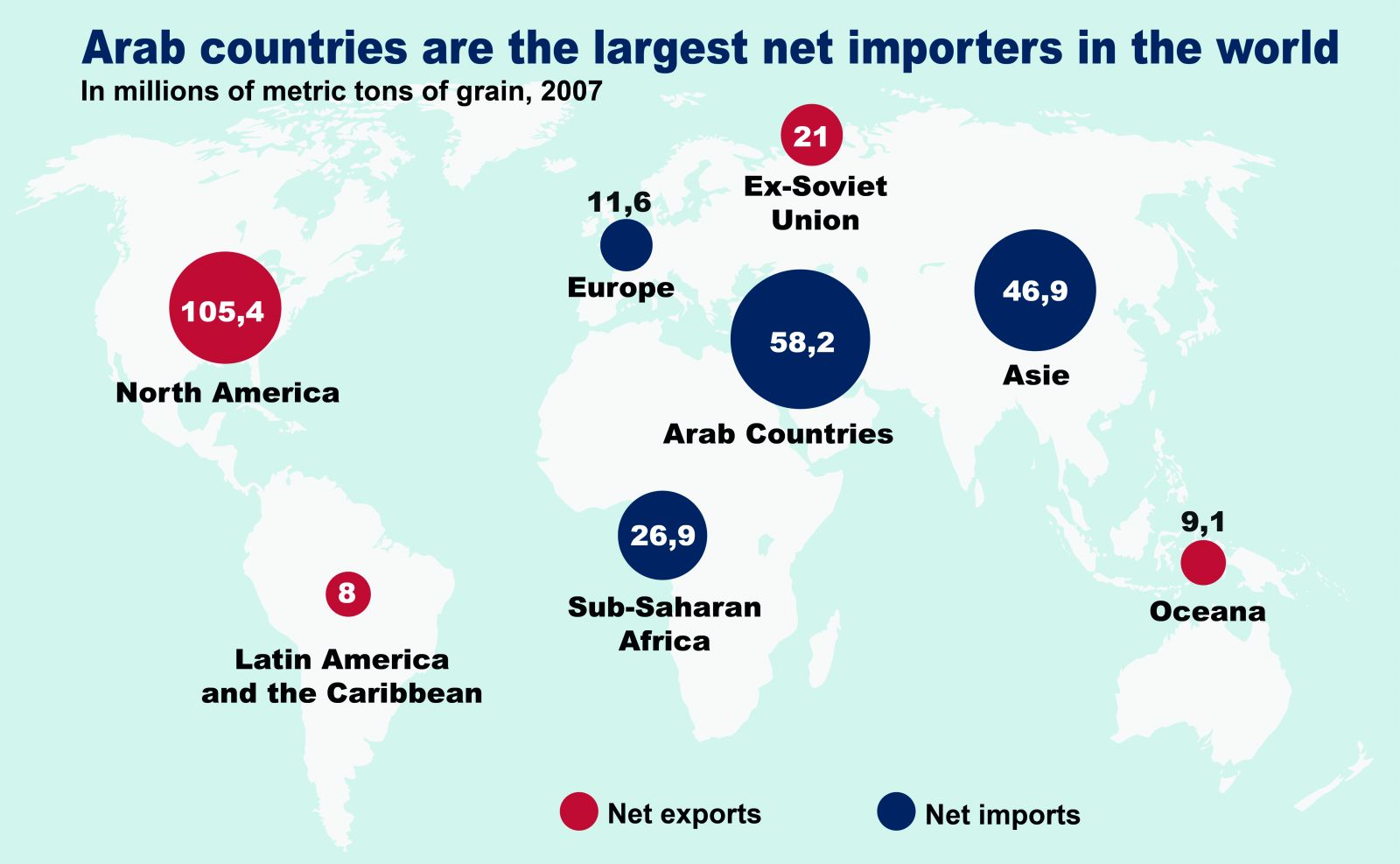
Source : IPEMDED.coop
Feeding its people is a source of legitimacy for the state. A state’s legitimacy is less disputed when the food needs of its population are met. Moreover, agriculture is not only for food. It is also a source of job creation and demographic regulation. Keeping peasants near their land helps to manage urbanization and regulate the flow of rural to urban migration maintaining them within manageable proportions. Public order is more easily maintained. This is amply verified in Africa:
- The social unrest was quickly diffused in Africa during the crisis due to food prices between 2007 and 2008. The riots due to the cost of living killed 40 people in Cameroon in February and generated violent incidents in the Ivory Coast, Mauritania and Senegal. In April 2008 in Egypt, five people died and three hundred were wounded in riots due to rising food prices;
- Today, the map of internal conflicts and destabilization in the African region corresponds to the map of the less developed agricultural areas.
In many respects, the stability of the state depends on the results of the equation concerning the state’s ability to ensure food security for its population, and its ability to guarantee internal public order. Its legitimacy depends on it. Two approaches are possible: the import of food with all the risks linked to dependency, or the development of its agriculture as part of a national strategy that makes the sector a priority, or if not a priority, at least one area where adequate attention must be granted.
2. Agriculture and position in the world
1. Agriculture and power
The question here is to understand the place of agriculture in the policies of the great powers. Can we detect a possible superposition of power in terms of global and agriculture development? For this, two comparison instruments will be considered: on one side, the top twelve global powers, and on the other, an equivalent map of agricultural powers.
Table 1: World powers in 2014
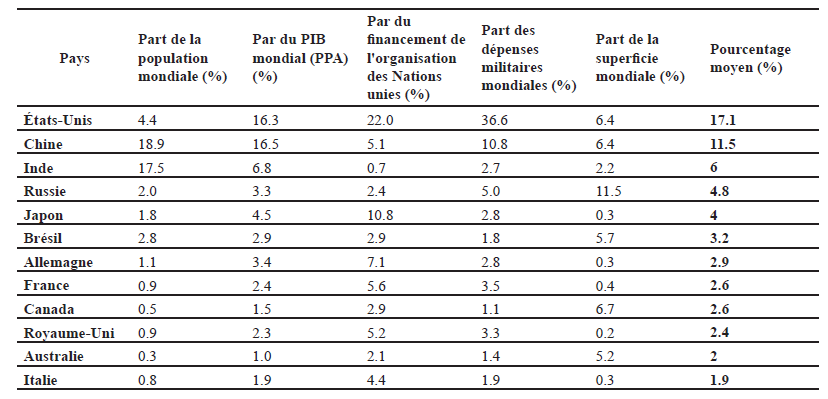
SourceWikipedia.org
The above table shows the twelve great powers based on three criteria: demographics, economy, and military budget, i.e. hard power.
On map No. 2 below, prepared by the National Statistics Office, adopted by the FAO, OECD and Eurostat, are the eleven most important global players in terms of agriculture. Included are the USA, Canada, Russia, Germany, France, China, India, Brazil, Argentina, South Africa and Australia.
Map 2: Major global players in the agricultural world
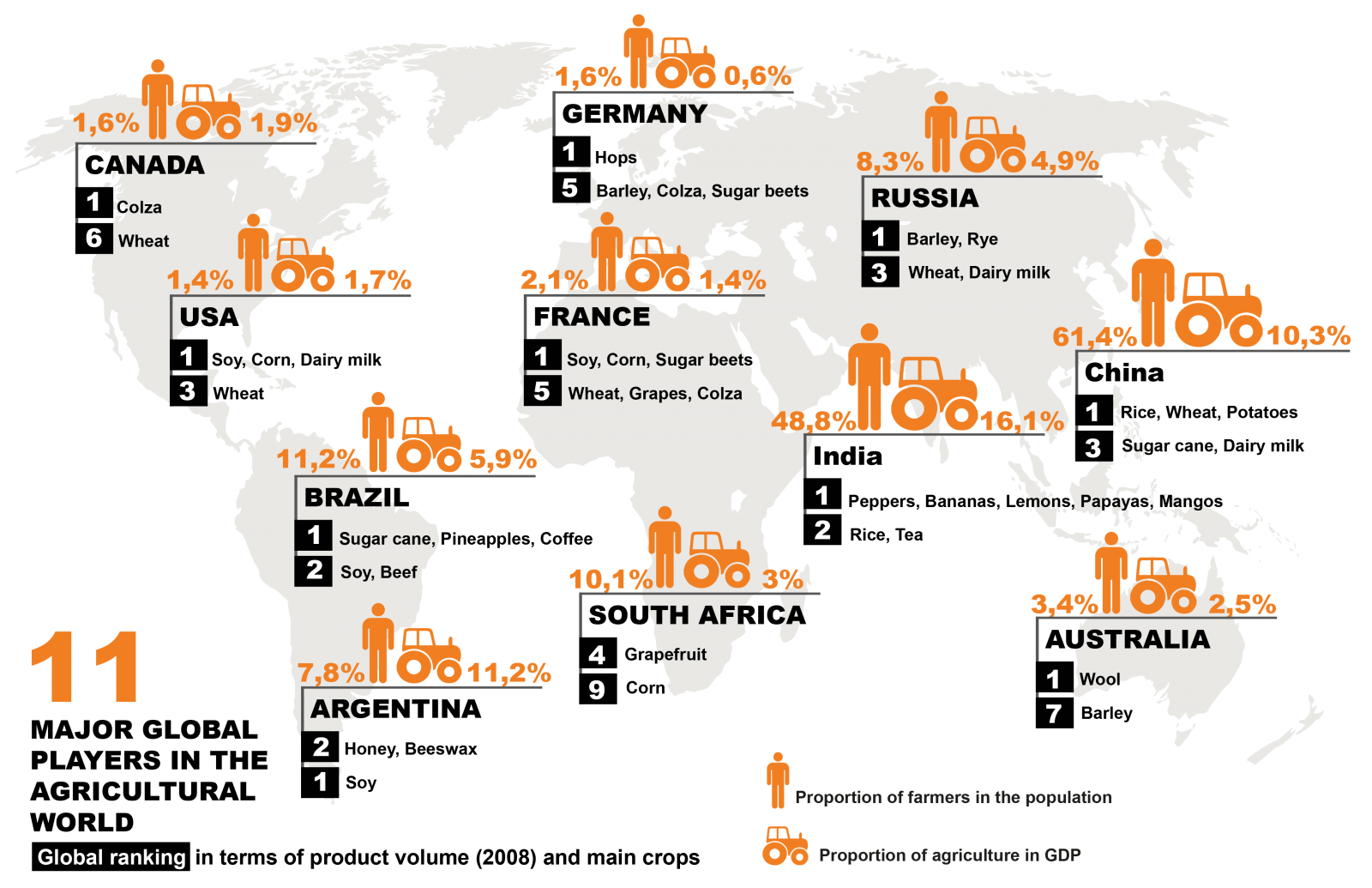
Source : 11 grands acteurs mondiaux de la planète agricole
In comparing the two instruments, it is clear that with the exception of Argentina and South Africa, agricultural powers are also hard powers. Additionally, if the United Kingdom and Japan are excluded, the hard powers are also agricultural powers.
Moreover, the countries listed both as agricultural powers and hard powers are less exposed to security hazards. These countries are the fittest for national defense, and are also the most active in terms of international policy.
If agriculture cannot alone ensure the proper positioning of a state internationally, the fact remains that the image of power is inconsistent with dependence in terms of food security.
Guy Mettan, a Swiss journalist, politician and author of the book Russia and the West, a thousand year war: from Charlemagne’s Russophobia to the Ukrainian Crisis, asks in one of his blogs: “should future power catalysts were based on agriculture instead of on energy?” His answer is yes, and points to the following as indicators of this new change:
- The competition that multinationals and states like China, Korea and Japan are engaged in to acquire farmland in Africa, Latin America and Ukraine.
- The case of Jean-Claude Gandur who made his fortune in oil trading and is now reconverting to agriculture by investing his assets in the acquisition of agricultural areas in West Africa.
Russia is also an example of a power that developed its agriculture to defend its interests in international relations. In response to European sanctions, Russia banned imports of European agricultural products and consolidated a plan initiated in 2012 to help farmers. This plan included cheap loans, a control of fertilizer prices, support for Russian manufacturers of agricultural machinery and the financing of key elements in agrarian infrastructure. As a result, in 2015, exports of Russian commodities exploded and wheat production has surpassed expectations. The development of agriculture responded to geostrategic imperatives and the confirmation of power by Russia. This agricultural development has enabled it to continue to sanction European agriculture without suffering shortages. The Russian strategy internalizes a principle that dependency hinders power.
2. Agriculture: A vital sector in Africa
a) African land monopolized: A threat to sovereignty
Africans should consider agricultural issues as a catalyst for public order and safeguarding social peace internally as well as a tool for their sovereignty. For this, some states on the continent need to reassess their farmland sales or lease policies to foreign firms or countries, especially in the context of intra-African cooperation, cooperation initiatives such as in Morocco on fertilizers can enable Africans to farm African farmland themselves (see map 3 below).
Map 3: Farmland transferred (sold, leased, etc.)
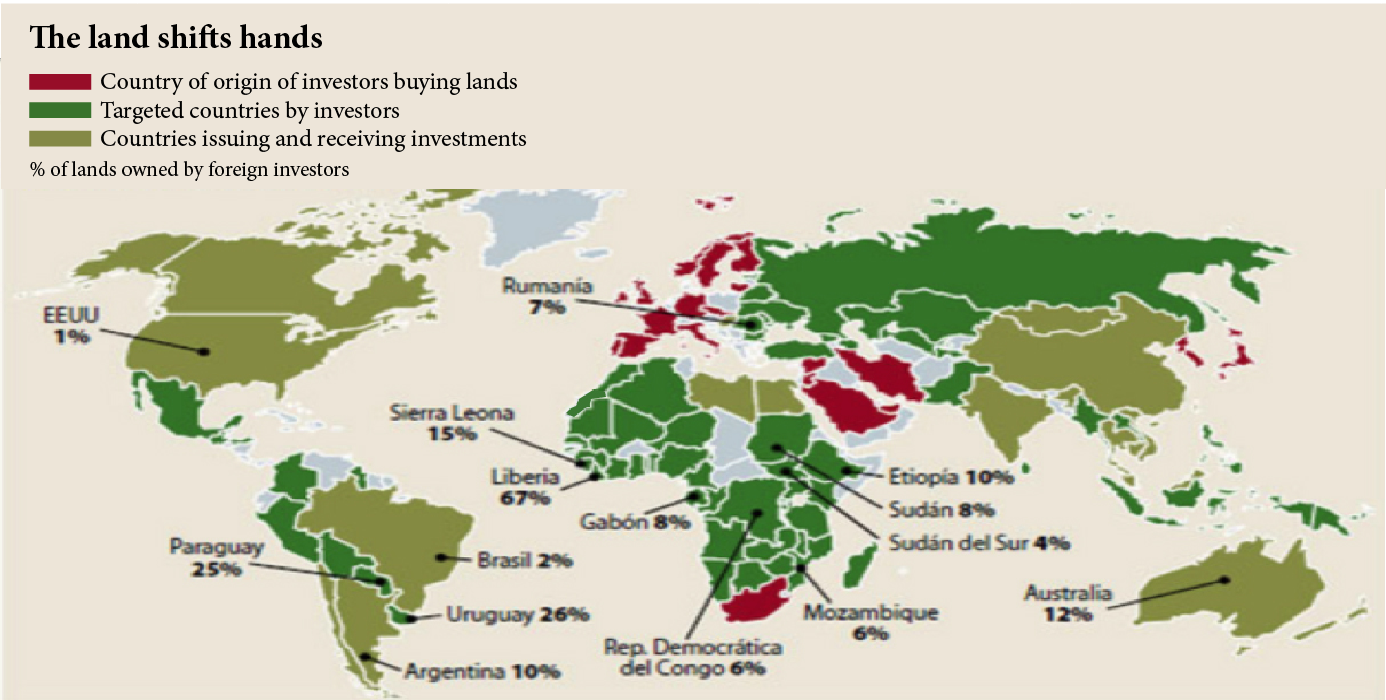
Source: Capital.es
In terms of strategic positioning, African countries must act so that their food security does not become dependent on “foreign” products produced on their own land. At stake is their sovereignty, especially when the volume of agricultural land transferred becomes alarming, as shown in the above map.
If Liberia reached the record with 67% percent of the land transferred, the current pace may result in similar figures in other countries where the proportion is still bearable.
Table 2: Percentage of farmland transferred

Source : Données recueillies sur : Wikistrike.com
It is possible to invoke the immediate benefits land concession such as job creation or increasing foreign investment, but it is also necessary to measure future effects including loss of sovereignty in food security.
b) African sovereignty: Each other’s land and experience
The Kingdom of Morocco, by projecting towards the African continent and with its position in the South / South cooperation framework, among other sectors, it prioritizes agriculture in particular through its experience in fertilizers:
- Morocco has set up a specialized unit in Jorf Lasfar that aims "to strengthen South-South cooperation" by producing "fertilizer suitable for crops and soils in Africa";
- Morocco’s projection in Africa in this area has four objectives:
- "Improving the fertility and productivity of African soil by offering suitable products;
- Securing the production of competitive fertilizer near the major agricultural areas;
- Ensuring the delivery of inputs to farmers;
- Contributing, with African farmers, to the development of sustainable agricultural ecosystems."
Morocco's approach falls within the context of its projection strategy in Africa, as well as its firm belief in the agricultural potential role that the continent can play in its economic development, its positioning in the world and therefore in resolving and preventing crises that destabilize the continent.
Conclusion: things to remember
Global trends include a population increase (Figure 1) and a reduction in arable land area due to climate change and increasing urbanization. The number of people that can be fed from the production of one hectare went from two in 1960 to six in 2050 (Figure 2). Feeding more people with less farmland requires technological progress and the development of appropriate public policies that take into account the vital aspect of food security in the global security system. Not only will tomorrow’s food crises be factors for the internal destabilization of states, but they can also generate political tensions, such as conflicts over farmland straddling borders or around shared waterways between the upstream and downstream states. The movement of people due to famine is also a security risk that must be taken into account in defense and security policies.
Figure 1: Growth and estimation of the world population from 1910 to 2050 (in billions)

Source: Mtaterre.fr
Figure 2: How many people can eat from a one-hectare field?

Source: Mtaterre.fr
In this configuration, the African continent has natural advantages that may turn into risks, due to a lack of public policies reflecting the seriousness of the situation. In this sense, precautions are to be observed regarding certain policies currently underway in the continent:
- Calls for industrialization with the aim of development in Africa must under no circumstances be at the expense of agriculture. Technological and industrial development should be symbiotic with agriculture or even to serve and develop it;
- The sale of farmland to foreign companies or powers must be studied both in terms of land status and in terms of maximum proportions to transfer, in order not to hamper a country’s sovereignty and its capacity to feed its people;
- Rural development plans (access to clean water, electricity, health care and education) will enable people living mainly from agriculture to live near their land in order to farm the land under the best conditions;
- Agriculture and all the related expertise and knowledge must be the cornerstone of African cooperation (South-South), in order to go beyond the simple concern for the continent’s food self-sufficiency, towards agriculture as a driving power.










